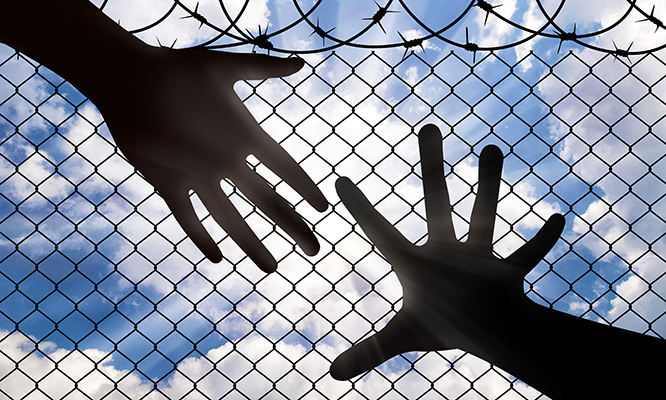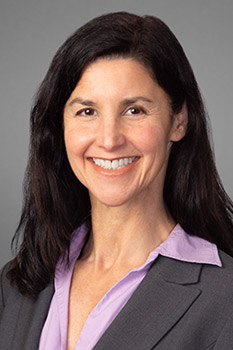
Last spring, a 15-year-old Guatemalan boy found himself thousands of miles away from home, without his parents in a country where he didn’t speak the language. His parents were itinerant farm workers from the Mayan highlands of Huahuatenango, Guatemala. They were often away, leaving him to fend for himself.
The boy, called “M.D.S.” to protect his identity, was trafficked to the United States by a man who claimed to authorities to be his father. They traveled on foot and by bus through Mexico and crossed at the Texas border in March 2019. There, they were separated by border officials.
M.D.S. was sent to a detention center for unaccompanied minors. He would be transferred to two other similar facilities before ending up in California, where Simmons Hanly Conroy Partner Deborah Rosenthal eventually took on his case on a pro bono basis.
Detained Adolescents Live in Fear, Desperation
Facilities like the ones where M.D.S. was housed in Texas and California, are managed by the Office of Refugee Resettlement (ORR). Found throughout the United States, such facilities presently house mostly migrants from Honduras, Guatemala and El Salvador, where rampant gang violence and corrupt governments make life so dangerous that fleeing is often preferable.
The journey refugees undergo is extremely dangerous. Children are vulnerable to human trafficking and a host of human rights abuses along the way. And once in U.S. custody, there’s no guarantee that life will be any better for them. ORR and ICE facilities are plagued with substandard care, with documented patterns of abuse and neglect. In fact, since September 2018, six migrant children have died in U.S. custody.
“There’s no dignity in how they’re being kept in these homes,” Elana Levites-Agababa, a former ORR center worker, told Slate. “People are profiting off detaining children.”
For M.D.S., it was not surprising that he had fallen into depression by the time a Texas immigration attorney named Ricardo de Anda found him and began working on his case.
As an immigrant child who was trafficked to the United States, M.D.S. qualifies for Special Juvenile Immigrant Status (SJIS) if a juvenile court finds that he cannot reunify with his parents because of abuse, abandonment, or neglect, and it’s not in his best interest to return to his country of nationality. SJIS affords him a path to lawful permanent residency in the United States. But immigrants are only subject to juvenile court jurisdiction while they are under the age of 18 and not in federal government custody.
To seek SJIS, he would need a sponsor — an individual or family who agrees to take on the responsibility of helping a migrant obtain legal resident status.
Partner Deborah Rosenthal Takes M.D.S.’s Case Pro Bono

In February, Mr. de Anda connected with Simmons Hanly Conroy Partner Deborah Rosenthal and began discussing M.D.S.’s case. A Minneapolis family wanted to sponsor M.D.S. and offer him a home. However, their application was denied because they had no familial relationship to M.D.S.
De Anda believed that this denial was a violation of the 1997 Flores Agreement, which ensures that the U.S. government adheres to basic standards of care for immigrant children in federal custody. He was prepared to petition the U.S. District Court for relief, but by this time, M.D.S. was at a detention center in the San Francisco Bay Area, so he needed a local attorney to assist. Time was of the essence, since M.D.S. turned 16 in April, and the process of applying for SJIS, through first the juvenile court and then the immigration court, would take time.
COVID-19 Fans the Flames
Just as de Anda and Rosenthal were preparing their case, COVID-19 hit California, and largely shut down courts and other public agencies. In addition to blocking M.D.S.’s access to justice, the pandemic presented another problem: The ORR was unprepared to provide a safe living environment for the hundreds of minors in its custody. Outbreaks of COVID-19 began to be reported at U.S. Immigration and Customs Enforcement (ICE) facilities.
Rosenthal and her legal team promptly filed a motion for a temporary restraining order, arguing that M.D.S. was at extreme unnecessary risk staying in congregate housing during a pandemic.
Because of the pandemic, however, all Department of Justice offices were closed due to shelter in place orders. The firm’s legal team was undeterred and tracked down contact information for the ORR staff involved in the case and for the U.S. Attorney from the Eastern District of California.
The team received a response from a U.S. Assistant Attorney almost immediately. In mid-June, the boy was released to the Minneapolis family who agreed to sponsor him. Not long afterward, the U.S. District Court Judge who oversees administration of the 1997 Flores Agreement, ordered ICE to release all migrant children who are presently detained in the nation’s family detention centers, citing reports of 15 confirmed cases of COVID-19 infection among detainees and staff.
“The family residential centers are on fire and there is no more time for half measures,” Judge Gee wrote in her ruling. “Although progress has been made, the Court is not surprised that [COVID-19] has arrived at both the [Family Residential Centers] and [Office of Refugee Resettlement] facilities, as health professionals have warned all along.”
The order directs ICE to release, by July 17, 2020, the 124 children currently housed in the nation’s family detention centers in the United States. It does not reach the roughly 1,400 minors in ORR custody but directs ORR to continue monitoring and to provide an interim report by July 24.
Thanks to the firm’s hard work, its pro bono efforts ended up being at the forefront of an important change in the legal landscape regarding family and child detention in the United States during COVID-19.




